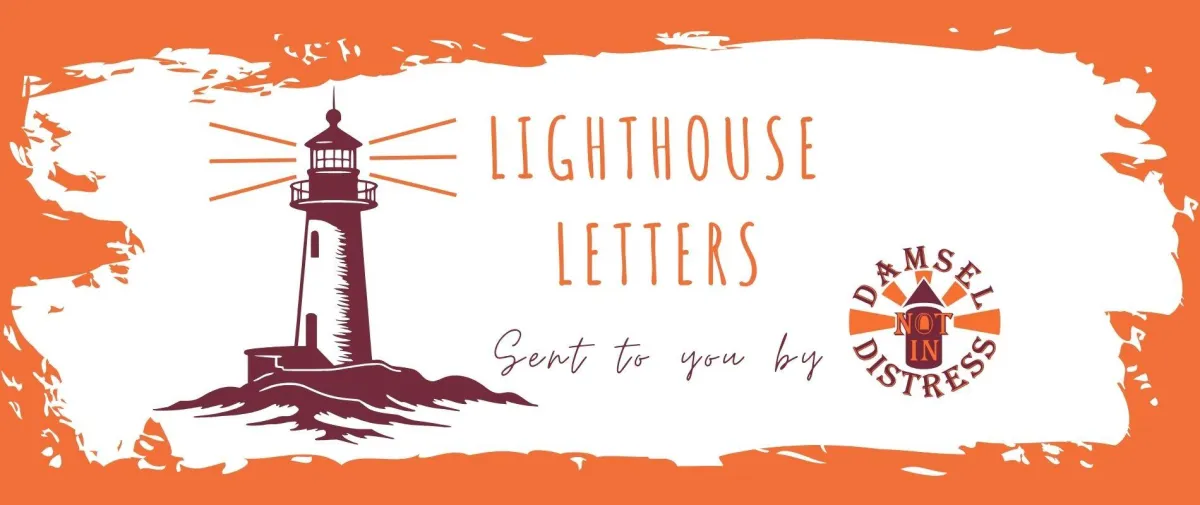The Damsel's Blog
Here you can find all my blog articles in chronological order, where I write about different aspects of thriving again after big life challenges:
I highlight different types of life storm, and what they may look like
I reflect on how storms affect us as leaders at work
I discuss some of the stages of the journey we may go through as we navigate our storms, using my SING model
I showcase particular wellbeing tools which can help us, and how we can get the most benefit from them
If you'd like me to let you know when I publish a new blog post, please sign up for Lighthouse Letters, my regular newsletter - it would be wonderful to welcome you into the community!

Your superpowers and kryptonite as a leader navigating a life storm
Maturing into leadership bestows us with superpowers...
These superpowers are things we can do which we can often take for granted, but which other people marvel at. We may always have possessed these abilities, or we may have grown into them. Either way, we are blessed with superpowers!
We all bring different leadership strengths to the table. Perhaps for you it’s the ability to galvanise teams into inspired action by painting a vivid picture of the future which you can co-create together. Or the gift of engaging with others at a deep level, knitting a team together so that it operates seamlessly and efficiently. Or the art of delivering a big project with a team, giving autonomy and overseeing effectively without ruffling feathers.
Of course, leaders generally need to be able to do all of the above and more in order to do their jobs well. But, in all likelihood, some of it will require more conscious thought for us, whereas other aspects will come more naturally, even effortlessly. That’s the superpower bit.
...but do we use these superpowers to help us in our storms?
The great news is that we can deploy our leadership superpowers to help us navigate life storms when they emerge out of the blue.
But the interesting question is, do we choose to do that? Or does the notion even occur to us?
It’s never easy to talk about our strengths. It too easily feels like bragging. But here goes…
I bring a laser attention to detail in my work. I could sniff out errors from fifty paces. Which I realise was sometimes a tad frustrating for the teams I led, but was also frequently instrumental in avoiding embarrassment and ensuring a high-quality product.
That same attention to detail has been a real asset as I have journeyed through my life storm. The ability to analyse a situation, break it down into its constituent parts, hypothesise about what might be causing what. Once I’ve done that, I can then start to figure out which intervention or combination of interventions has the best chance of moving the needle.
I’m dogged. Even if I’m not enjoying a task, if I know it has to get done, it gets done. And I do it on time. I’m disciplined, and people know they can rely on me to deliver.
This has also been such a helpful attribute to me in my life storm. I haven’t given up. And I have stuck at routines and techniques which may not be fun at the time, but which I know will reap benefits in the longer term. Right now, I’m implementing a self-inflicted bout of sleep restriction therapy. It’s a form of cognitive behavioural therapy for insomnia, and it’s about as much fun as it sounds. But I know from past experience that it can bring real benefits for my sleep, so I’m willing to give it my best shot.
And I’m empathetic. I have a bit of a radar for picking up when someone’s suffering, and my instinct is to try to be there for them and help if I can, even if it’s tough.
I don’t think I was so good at applying this empathy to myself for many years. I spent a lot of time chiding myself for having so many issues. Wishing I were stronger. Feeling inadequate. And I thought the only way forward was to push through despite the pain. I was really resilient, but not really so kind to myself.
That’s something I’ve learned to do more in the past five years or so. Really absorbing that I am intrinsically valuable apart from what I accomplish. And that it’s OK to take time to listen to myself and give myself what I need. And in fact, that’s when I am at my most fruitful.
That old adage about speaking to yourself as you would to your best friend – there’s so much wisdom in that.
So, I’d really encourage you to think about how you can bring your glorious leadership superpowers to bear in your life storm!
There’s always a flip side, right?!
Leadership also brings with it some kryponite when it comes to life storms.
We think that, as leaders, we are supposed to be able to handle everything by ourselves. We believe that we are expected to have our stuff together by now, because we’re responsible for big things and big teams.
So, our view – whether consciously or subconsciously – is that asking for help is a sign of weakness.
In fact, we may not even consider the possibility. I had a conversation with a leader recently who was recalling a previous life storm. She reflected that it had literally never occurred to her to seek out support when she was in the midst of the struggle. Only now, in hindsight, did she recognise the toll that the life storm had taken on her – and how invaluable it would have been to have an ally who was truly in her corner and could help her process what was happening as events unfolded.
I would like to bust this independent-leader-who-has-it-all-sussed myth out of the water. Even as leaders, we’re 100% human, and humans aren’t meant to function in isolation. Sometimes all of us need help, because that is just what it is to be human.
In fact, I would go further than that. I believe that seeking help as a leader facing a difficult situation is actually a sign of strength. A sign of wanting to be the best version of ourselves. And a sign of knowing that we can’t do that alone.
So here’s to deploying our leadership superpowers to help us navigate our life storms, and to busting the myth that we should somehow be expected to find our way on our own.
Before you go, you can find out more about how to put together your very own Leader’s Storm Toolkit with my free video guide. You wouldn't go out unprotected in a physical storm, so why allow yourself to be ill-equipped in the face of your life storm? I’d be delighted to share my top tips for putting together a toolkit of wellbeing techniques which is tailored to your needs in the storm. You can sign up here!

© Damsel Not in Distress Ltd,
Company no. SC770248, All Rights Reserved
Damsel Not In Distress ® is a registered trade mark



